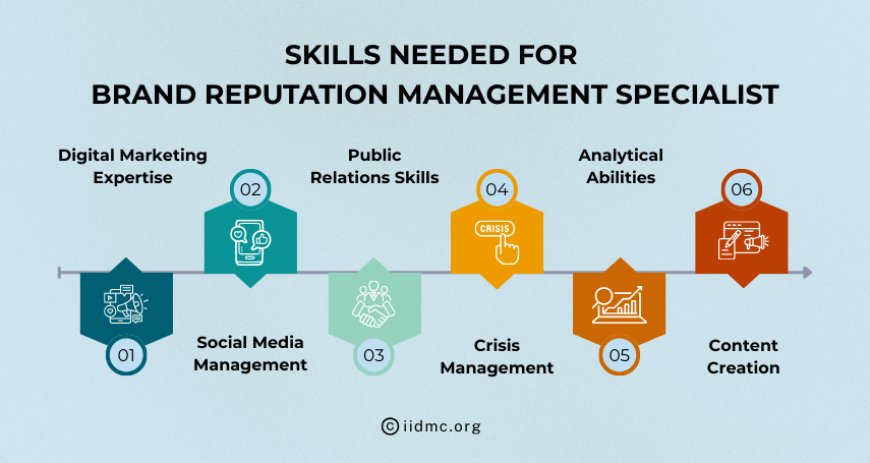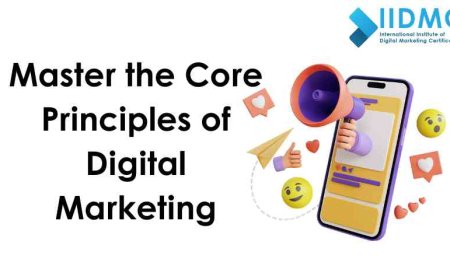How to become a Certified Brand Reputation Management Specialist
Learn how to become a Certified Brand Reputation Management Specialist and boost your career with essential skills in online reputation and crisis management.

Brand Reputation Management has become an essential part of marketing, helping businesses build and protect their image online. It includes strategies that make sure customers, clients, and the public see a brand in a positive way. As more companies focus on their online image, the need for certified Brand Reputation Management specialists is increasing. This role requires the combination of skills in digital marketing, social media, and managing crises to ensure brands stay recognized for the right reasons.
Becoming a certified Brand Reputation Management specialist opens up many career opportunities in this fast-growing field. Certification programs are designed to give you the knowledge and skills you need to monitor and improve a brand's reputation on different online platforms. These programs usually cover important topics like public relations, managing online reviews, creating content, and SEO strategies. By earning this certification, you can show your expertise to potential employers or clients, making you a valuable addition to the brand management industry.
What is Brand Reputation Management?
Brand Reputation Management (BRM) is the process of managing the public perception of a brand. This includes various actions to improve and protect how a brand is viewed by consumers, the media, and the general public. The main goal of BRM is to ensure that a brand’s online presence is positive and trustworthy. Key components of BRM include:
-
Monitoring Online Mentions: Brands need to track what is being said about them on social media, blogs, review websites, and other online platforms. This helps identify both positive and negative comments.
-
Improving Public Perception: Brands often take proactive steps to boost their image, such as publishing positive content, addressing concerns, and responding to customer feedback.
-
Crisis Management: When negative events happen (like product recalls or a scandal), a BRM specialist is responsible for managing the situation and minimizing damage to the brand's reputation.
-
Building Trust: A strong reputation encourages customers to trust a brand, which leads to long-term loyalty and more sales.
As the online world continues to play a major role in shaping public opinions, businesses are recognizing the value of having a skilled specialist to manage their reputation effectively.
Skills Required to Become a Brand Reputation Management Specialist
To be successful in Brand Reputation Management, you need a diverse skill set. Here’s a breakdown of the essential skills:

-
Digital Marketing Expertise: As a Brand Reputation Management specialist, you must have a solid understanding of online marketing, including SEO, content creation, and social media strategies. These skills help improve a brand’s online presence and push positive content to the forefront.
-
Social Media Management: Social media platforms like Facebook, Instagram, and Twitter are where most public conversations about brands happen. You need to be comfortable with these platforms, engage with customers, and manage the brand’s voice online.
-
Public Relations Skills: You’ll often be the spokesperson for the brand, responding to media inquiries, writing press releases, and managing public communications. It’s crucial to maintain a professional and positive tone when dealing with media or customer complaints.
-
Crisis Management: Negative comments, bad reviews, or scandals can severely damage a brand’s reputation. A BRM specialist needs to act quickly, strategically, and calmly in these situations to mitigate harm and rebuild trust.
-
Analytical Abilities: Reputation management isn’t just about reacting to events; it’s also about analyzing data. Specialists use tools like Google Analytics, sentiment analysis, and social media listening tools to track and measure public perception over time.
-
Content Creation: Writing engaging and informative content is key to promoting a positive image of the brand. Whether it’s blog posts, social media content, or press releases, good writing skills are essential for creating a consistent and trustworthy brand voice.
Steps to Becoming a Certified Brand Reputation Management Specialist
Now that you understand the skills needed, here’s a step-by-step guide to becoming a certified Brand Reputation Management specialist:
Step 1: Research Certification Programs
Before getting into certification, do some research to find a program that best suits your career goals. There are various online platforms and institutions offering certification courses. Some popular options include:
-
DigitalMarketer: Known for providing comprehensive training in digital marketing, including Brand Reputation Management.
-
Reputation Management Institute: This institute specializes in reputation management certification and focuses on crisis communication, online review management, and customer relations.
When researching programs, look for accredited courses with positive reviews, as this will ensure the certification holds value in the industry.
Step 2: Enroll in a Program
Once you find the right program, you can enroll and start learning. These programs typically offer flexible learning options, including online modules that allow you to study at your own pace. Courses usually last from a few weeks to several months. During this time, you’ll learn the key concepts of Brand Reputation Management and how to handle different scenarios.
Some programs may also offer mentorship or direct support from instructors, which can help you clarify doubts and gain practical insights into the field.
Step 3: Learn Key Concepts
During the course, you will cover several important topics such as:
-
Online Reputation Monitoring: How to use tools like Google Alerts, Mention, or Brandwatch to track online mentions of a brand and assess public sentiment.
-
Managing Reviews: Strategies for handling online reviews, whether they’re positive or negative. This includes crafting responses to customers and engaging with reviews on platforms like Yelp or Google Reviews.
-
SEO for Reputation Management: Learn how SEO techniques can help push down negative search results and highlight positive content about the brand.
-
Crisis Management: How to handle a public relations crisis, whether it’s a product failure, a social media misstep, or a customer complaint. You’ll learn how to craft effective responses and rebuild a brand’s reputation after a setback.
-
Content Strategy: How to create content that enhances the brand’s reputation, from blog posts and social media updates to press releases and email campaigns.
Step 4: Gain Practical Experience
While you’re learning, it’s a good idea to gain practical experience. This could be through:
-
Internships: Seek out internships in digital marketing agencies, public relations firms, or companies that need reputation management.
-
Freelancing: Offer your services as a freelance Brand Reputation Management consultant. This allows you to work with different brands and build a diverse portfolio.
-
Volunteering: Consider volunteering for small businesses, non-profits, or local organizations to help them manage their online presence and reputation.
Gaining real-world experience will not only improve your skills but also make you more attractive to potential employers.
Step 5: Take the Certification Exam
After completing your coursework and practical assignments, you’ll be ready to take the certification exam. This exam usually includes multiple-choice questions, case studies, and practical tasks where you’ll have to demonstrate your ability to manage a brand’s reputation. Once you pass, you’ll be officially certified.
Benefits of Getting Certified
Becoming a certified Brand Reputation Management specialist brings many advantages:
-
Career Opportunities: With a certification, you’ll have access to numerous job opportunities across various industries. Brands are constantly looking for professionals who can manage and improve their online reputation.
-
Credibility: Certification enhances your credibility, showing employers and clients that you are trained and knowledgeable in reputation management.
-
Higher Salary: Certified professionals often earn more than those without certification due to their specialized skills.
-
Job Satisfaction: Helping brands maintain a positive reputation is rewarding. It allows you to protect a brand’s integrity and influence its success.
Best Institute for Brand Reputation Management Certification
If you're looking to become a Certified Brand Reputation Management Specialist, IIDMC (International Institute for Digital Marketing Certifications) is one of the best institutes to consider. IIDMC offers a comprehensive certification program designed to equip you with the skills and knowledge needed to manage and protect a brand’s reputation in the digital age.
Certification Offered by IIDMC: Certified Brand Reputation Management Specialist
This certification provides you with the expertise to handle online reviews, manage public perception, and deal with crises. The course is tailored for those who want to learn how to monitor, protect, and build a brand’s reputation effectively.
Why Choose IIDMC?
-
Industry-Recognized Certification: IIDMC certifications are highly respected in the digital marketing industry. Earning the Certified Brand Reputation Management Specialist title will enhance your career prospects and increase your credibility.
-
Comprehensive Curriculum: The program covers all key aspects of brand reputation management, including social media management, online review handling, crisis management, and public relations strategies.
-
Flexible Learning: IIDMC offers online courses, allowing you to learn at your own pace and from anywhere in the world. The platform is user-friendly, making the learning experience smooth and accessible.
-
Global Reach: IIDMC has a global presence, and its certifications are recognized worldwide. This opens up job opportunities and helps you work with clients from different regions and industries.
Where Can Certified Brand Reputation Management Specialists Work?
As a certified Brand Reputation Management specialist, you can work in different environments, including:
-
Marketing Agencies: Many marketing agencies hire BRM specialists to handle reputation management for their clients.
-
Corporations: Large companies often have in-house teams that focus on managing their reputation across digital platforms.
-
Freelance or Consulting: If you prefer flexibility, you can offer your services as a freelance consultant, helping businesses with their reputation management strategies.
-
Public Relations Firms: PR firms are always looking for specialists who can manage a brand’s reputation and protect it from negative publicity.
-
Non-Profits: Even non-profit organizations require reputation management, especially when running public awareness campaigns.
Challenges in Brand Reputation Management and How to Overcome Them
Brand Reputation Management (BRM) comes with its own set of challenges. Here are some of the most common problems and how to deal with them:
-
Dealing with Negative Reviews: Negative reviews can affect a brand’s image. It's important to respond quickly and politely, showing the brand cares about customer concerns and is willing to make things right.
-
Handling PR Crises: Crises like scandals or negative media coverage can harm a brand. To manage this, have a crisis plan in place, and address the situation openly and honestly to restore trust.
-
Maintaining Consistent Brand Messaging: Consistency is key to building trust. Make sure the brand’s message is clear and uniform across all platforms to avoid confusion.
-
Managing Public Sentiment and Shifting Opinions: Public opinions can change quickly, especially on social media. Monitor sentiment regularly and respond to negative shifts early to prevent long-term damage.
-
Staying Ahead of the Competition: Competitors can use new strategies to boost their reputation. Keep learning and updating your methods to stay ahead and ensure your brand’s reputation remains strong.
The Future of Brand Reputation Management
As digital platforms evolve and customer expectations change, Brand Reputation Management (BRM) will continue to grow and transform. Here are five key trends that will shape the future of BRM:
-
Increased Use of Artificial Intelligence (AI): AI will help brands monitor their reputation by quickly analyzing large amounts of data. This will allow brands to spot issues early and respond faster.
-
Greater Focus on Authenticity: Customers want brands to be honest and real. Companies will need to focus on clear, transparent communication rather than just polished marketing.
-
Rising Importance of Social Media: Social media will remain a key tool for managing a brand’s reputation. Brands will need to be quick and proactive in addressing customer concerns and engaging with their audience online.
-
Integration of Customer Feedback in Brand Strategy: Brands will use customer feedback to improve their products and services. Listening to customers will help brands build loyalty and stronger relationships.
-
Focus on Data Privacy and Ethics: Brands will need to protect customer privacy and use data responsibly. Transparency about data collection and use will be key to maintaining a positive reputation.
Becoming a Certified Brand Reputation Management Specialist is a great way to build a successful career in digital marketing. By gaining the right skills in managing online reputation, handling customer feedback, and addressing crises, you can help businesses maintain a positive image. With the right training, such as through a program like IIDMC's certification, you can gain valuable expertise to enhance your credibility and open doors to various job opportunities. With dedication and the right resources, you can position yourself as a trusted expert in the growing field of brand reputation management.





























